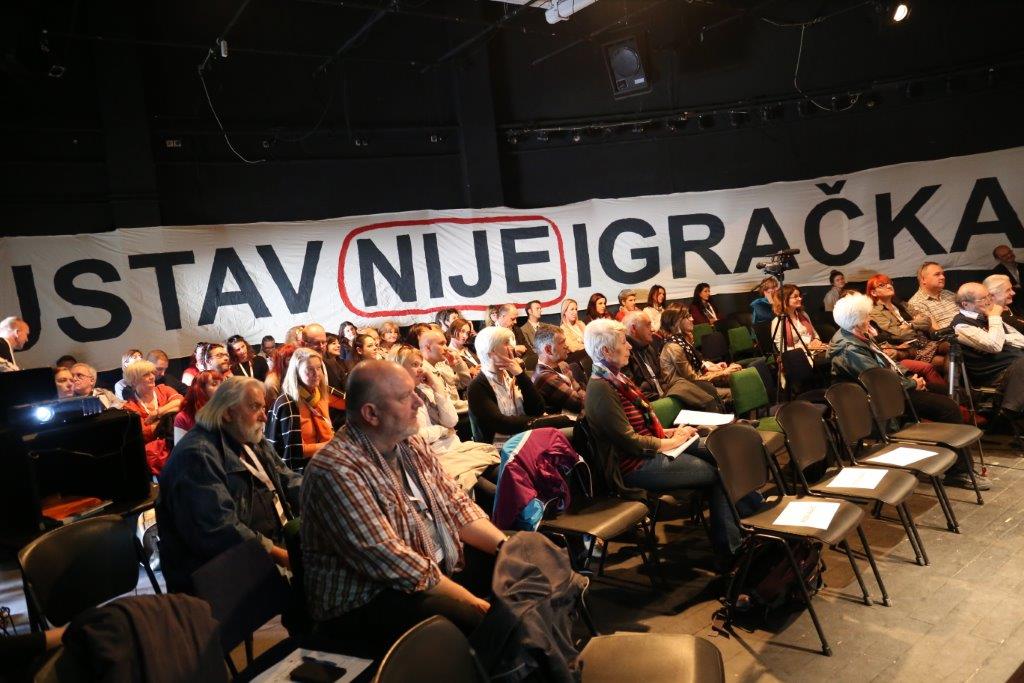The conference „In Search of a Citizen: Regional Time-machine of Activist and Artistic Practices“ took place on April 13, 2017, on the occasion of GONG’s 20th birthday. The event involved 208 citizens, including 169 participants from Croatia, 10 participants from Serbia, 6 participants from Montenegro, 10 participants from Macedonia and 13 participants from Bosnia and Herzegovina. The video is available HERE, while the program of the conference and the exhibition can be found HERE.
The purpose of the day-long regional time-machine was to affirm, but also question the tradition of progressive activism and artistic accomplishments in disputing and reshaping the dominant political, cultural and social matrices in ex-Yugoslavia. The area itself is marked by conflicts, poverty, devastation of public goods and spaces, distrust and deep divisions. Nonetheless, it is also connected on different levels – its old and new borders, injustices, traumas as well as creative forms of resistance, healing and innovations.
The concept of the conference was developed in partnership with the Center for Cultural Decontamination from Belgrade, the Helsinki Citizens’ Assembly Banja Luka, association CIVIL from Skopje, association ANIMA from Kotor and KURZIV from Zagreb. The event itself was organized in cooperation with the Students’ Centre Culture of Change and financially supported by the Europe for Citizens program and the Knowledge Centres for Social Development program of the National Foundation for Civil Society Development.
The conference gathered around 150 activists, artists, researchers and journalists from the entire region. Four panel discussions focused on political events that marked the activist and artistic practices in an era, starting from the late 1980s to the present day. Topics included the logic of choosing political and social topics which demanded action, the formats and technologies used, the ways ideas and practices were transferred across physical and mental barriers. Finally, they reflected on the response and reach of citizens and the impact on public discourse and the production of counter-discourses in time and space.

The introductory discussion entitled „In Search of a Citizen: Civil Society, Independent Culture and Media as Spaces for Imagining Citizens as Political Subjects“ moderated by Jelena Berković from GONG, focused on the function of activism, independent culture and media in disintegrating the dominant regimes of fear, division and violence. Despite resistance and developing alternatives, the repressive systems are successful in self-renewal, as stated by Toni Vidan from Friends of the Earth Croatia: „We find ourselves in an ever-faster world in which positive change is barely visible, and regression in many policy areas is huge.“ Borka Pavičević from the Center for Cultural Decontamination warned of the power of propaganda: „We are here under the heading ‘media as the space for imagining citizens as political subjects’. But citizens already are subjects, while imagining different things became propaganda tools in the hands of powerful individuals, political stars.“ Dejan Kršić, designer and activist, and one of the founders of Arkzin, reflected on the degradation of journalism: „The standards of journalism were falling before our eyes, as a result of a continuous erosion of public funding. During the 1990s, within the Antiwar Campaign we fought against journalistic professionalism, yet today, we are fighting for a minimum of professional standards in journalism.“

Mijat Stanić from the Independent Union of Motorway Workers reminded us of the interconnectedness of war and social and economic devastation of the 1990s, whose consequences we are still witnessing: „Activism within unions is only seemingly a niche of its own, social and economic problems and the erosion of safety went hand in hand with war-time threats to life during the 1990s .” For Nidžara Ahmetašević, a journalist from Sarajevo, refugee status was a formative experience for many of her life-choices: „I lived it here in Croatia and Zagreb, which were much different, and more excluding than today. Yet, so many years later, we have borders where controls are getting stricter and exclusion is being practiced, since – ironically – Bosnia is supposedly a source of terrorist threat.“

In spite of many reasons for pessimism, the weaving of the solidarity networks was recognized as the main source of perseverance and motivation for different generations of activists working simultaneously, although at different locations. This was the key message articulated by Suzana Jašić, GONG’s first president, during the opening of the conference: „Today, more than ever, national and international cooperation is important. Instead of thinking where we went wrong, we should think about what to do next. Today we need to make clear who and what is civil society. We are here. We are not going anywhere. We are staying here for good and we will be even louder!“
The video of the conference discussions in Croatian is available HERE.

